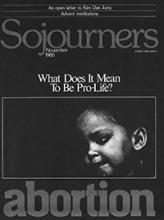I have not always been pro-life. In the years of the late '60s and the decade of the '70s I was for abortion. It was the popular opinion of everyone I knew. I accepted the doctrinal orthodoxy of the women's movement which states that the right to abortion is an absolute necessity for liberation and equality with men. In this view we women must have full control of our bodies and reproductive lives; by not being saddled with pregnancies and children, we could have the freedom men do to reap the rewards of the system so long denied us.
My religious outlook led me to think that legalized abortion was far better than the horror and ugliness of "back-alley" or self-induced abortions. I reasoned that legalizing abortion would actually save lives. Abortion seemed a positive and humane solution for poor women who could not afford another mouth to feed--humane for the child as well as the mother.
After abortion was legalized in this country in 1973, I found myself looking down on women who kept having baby after baby: "Even if their birth control failed, they could have had an abortion," I thought. I couldn't imagine someone willingly raising more children than she wanted. The question of the possible elitism of that attitude didn't bother me. In the same way I unquestioningly accepted aborting potentially retarded or handicapped babies, unknowingly presuming the superiority of the hearing, the sighted, and the intellectually able.
Admittedly, I was a little shocked to hear a friend tell of having an abortion because she and her husband didn't want any more children. Though I thought myself a feminist, I saw abortion as a solution for the poor and unmarried. I thought that the life produced by two committed married people (i.e., people I knew) should be allowed to live. They could afford to make arrangements and changes in their lives.
Read the Full Article

